Clique aqui para Português
This article is part of RioOnWatch‘s series on Memories of Favela Power, which documents and celebrates the history of Rio de Janeiro’s favelas through narratives and reports from residents’ collective memory, in their daily struggle to lead fulfilling lives. Published with English subtitles for World Capoeira Practitioner’s Day, or August 3, this mini-documentary presents the Afro-Brazilian martial art capoeira as an Afro-diasporic survival strategy, a tool for physical and mental health, a symbol of belonging, and an asset in the development of subjectivities, particularly for Black children.
Introduced to capoeira at 14 as a birthday gift from his mother, law student Eduardo Costa, 38, is better known as Mestrando Morcego. “Mestrando” is the title for capoeira instructors on their way to becoming masters, or Mestres. He teaches at the Iguaçu Arte Capoeira Cultural Center and leads classes both at the organization’s facilities and in the streets of Nova Iguaçu, a city in Greater Rio de Janeiro‘s Baixada Fluminense region.
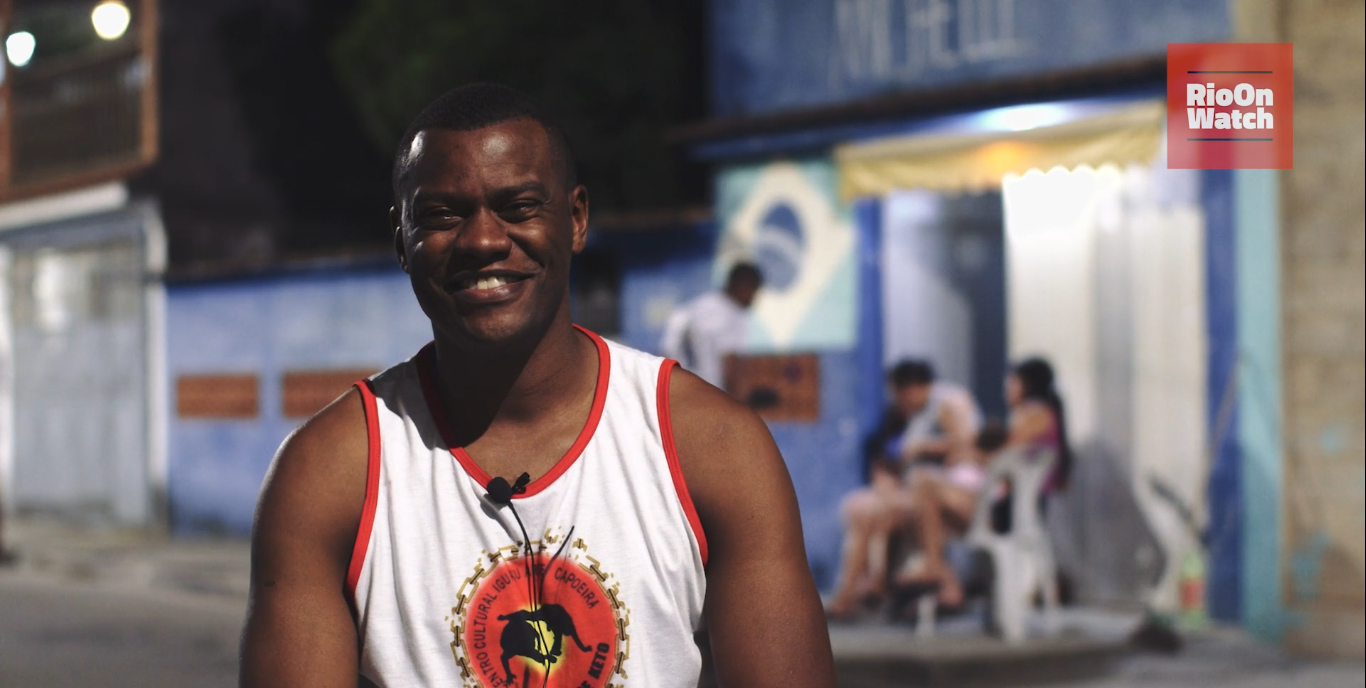
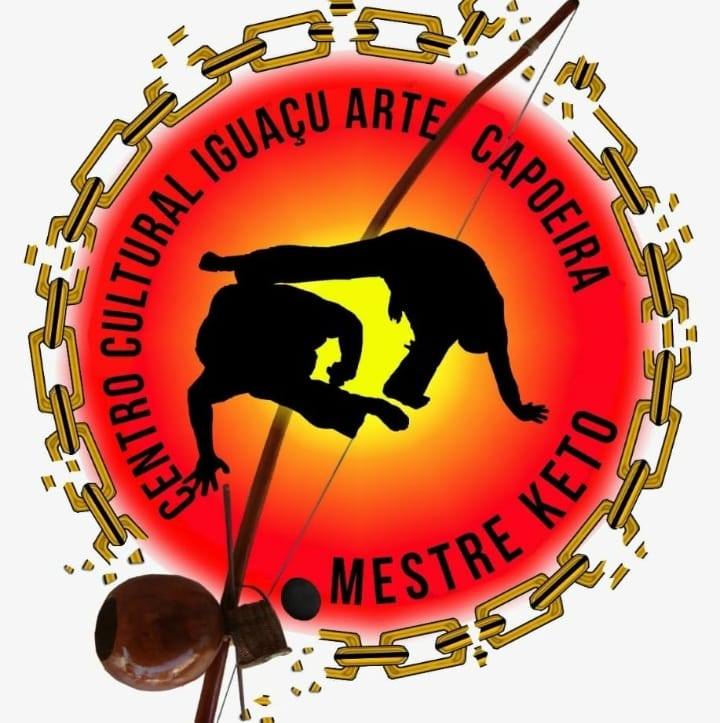
Like others expressions of the African Diaspora, capoeira continues to face racism, including religious, along with stigma and prejudices. In this video report, Mestrando Morcego highlights the issue, sharing his personal perspective and experiences.
“I started capoeira when I was 14… I’ve stayed with it for 24 years… [but] I’ve had to stop because of compulsory military service… then, I had to take a break for work reasons. It’s just the way it is; we don’t have the resources. Capoeira is often frowned upon, though I believe that’s changing… Capoeira doesn’t belong to any religion; it’s for everyone! I myself am evangelical, I’m Christian, and I practice capoeira.” — Eduardo Costa (Mestrando Morcego)
An entirely volunteer initiative, his classes attract over 30 young people each week. In a sublime act of subverting the criminalization of Afro-diasporic culture, these lessons on Black ancestry through self-defense primarily serve children under ten.
Founded in December 2006, Iguaçu Arte Capoeira is led by Mestre Keto. Its headquarters are located in the Carmary neighborhood of Nova Iguaçu. The center serves as a hub for various groups participating in the project and that then take the rhythm and Afro-Brazilian ancestry of capoeira to students in neighboring areas.
Responsible for capoeira classes in the Nova América neighborhood, Mestrando Morcego believes that capoeira helps develop social connection in addition to providing physical benefits. His classes align bodily movements with a firm and just stance, preparing individuals, especially children, to engage as part of society.
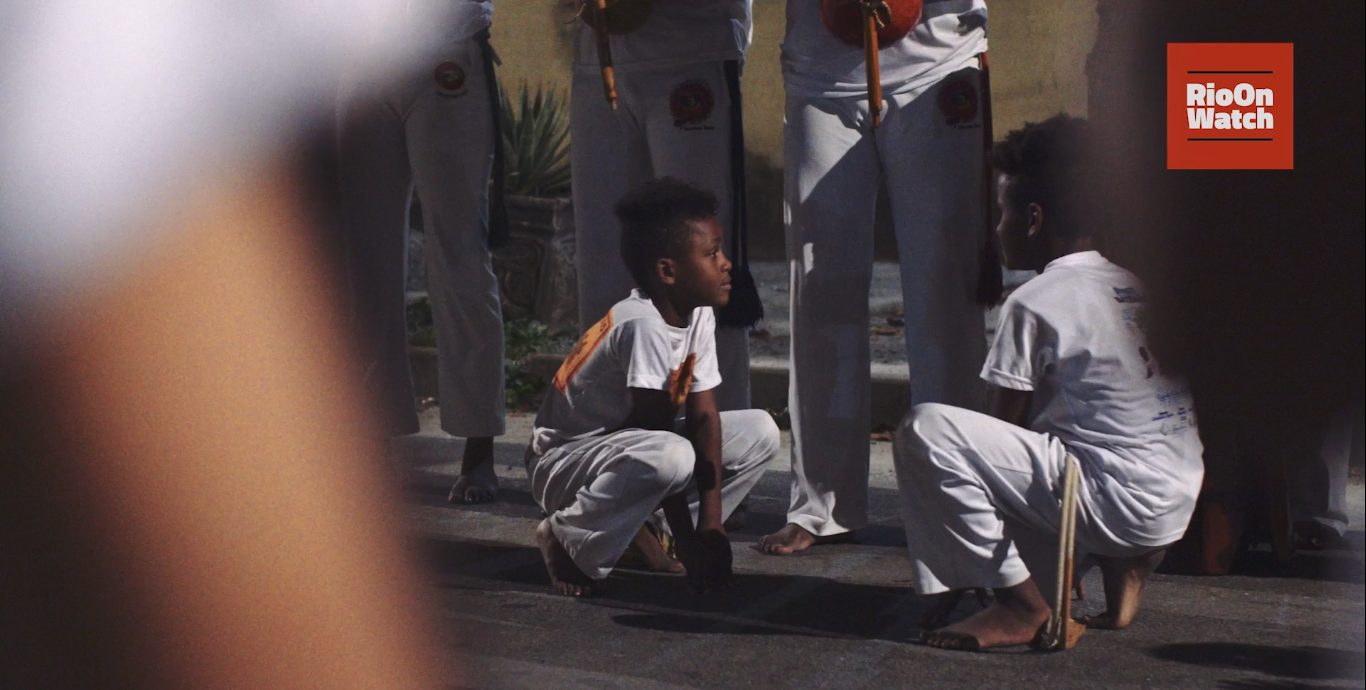
During capoeira batizados, which are literally baptisms, practitioners receive a nickname that roots their belonging within capoeira. Just like Keto and Morcego, students also receive their capoeira names. One of Keto’s students, Dyennie dos Santos, 33, was given the nickname Cegonha [Stork]. She speaks about the importance of reclaiming ancestry through capoeira and the work of Mestrando Morcego and Mestre Keto.
“I’ve practiced other sports, but I found my identity in capoeira because it reconnects us with our ancestry… I’m teaching children, which is something I never imagined myself doing, and the children welcomed me with open arms… If I can be even a third of what they [Mestre Keto and Mestrando Morcego] represent to me, it will be wonderful!” — Dyennie dos Santos (Cegonha)
The accounts of Cristofer Nascimento, 29, nicknamed Charada [Riddler], highlight the physical health benefits of practicing capoeira. For him, suffering from a respiratory illness, the improvement has been remarkable.
“I’ve been on this journey since 2004. Since childhood, capoeira has brought benefits to my health. I have respiratory health problems but they’ve gotten better. Nowadays I am very grateful to capoeira. I’ve made friends and met a Mestrando [Morcego] who’s like a father to me. He’s gotten me out of a lot of trouble, given me a lot of advice.” — Cristofer Nascimento (Charada)
However, the impacts of capoeira also extend to more subjective layers of an individual’s existence. Especially for someone who is Afro-diasporic and lives in a stigmatized, predominantly Black area like Nova Iguaçu, capoeira is a meeting with oneself, a means for physical and mental fulfillment.
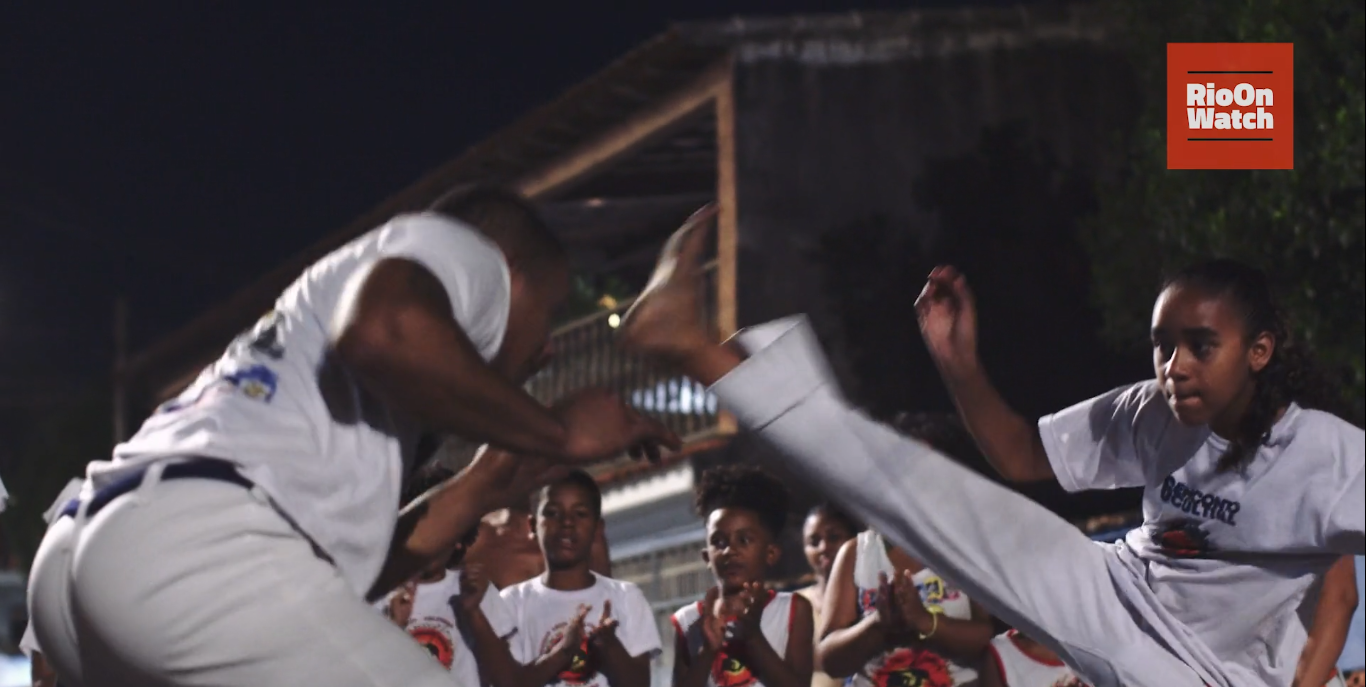
Mestrando Morcego reflects on how capoeira has helped him overcome shyness. A sublime act of subversion, the Black ginga [swinging motion central to capoeira] also enhances self-esteem and mental health.
“Capoeira was a turning point for me. I was a very quiet child, very shy. Capoeira helped me relax. Through capoeira, I got to know a lot of places that I never imagined!” — Eduardo Costa (Mestrando Morcego)
Just as it did for him, for others, capoeira serves initially unexpected functions. This is also true for Thaiane Christine, 31, nicknamed Cacheada [Curly], one of Morcego’s students, who finds strength in the ancestral Black ginga in her fight against anxiety.
“I started my journey in 2019. I train with Mestrando Morcego… capoeira added quality to my life… Because I have anxiety, I suffer from anxiety… Sometimes we come to practice with our heads full of thoughts… and in capoeira you can simply open your mind. It’s just you, the movement, the music, you can get absorbed. I didn’t just get practice buddies, I got a family in capoeira.” — Thaiane Christine (Cacheada)
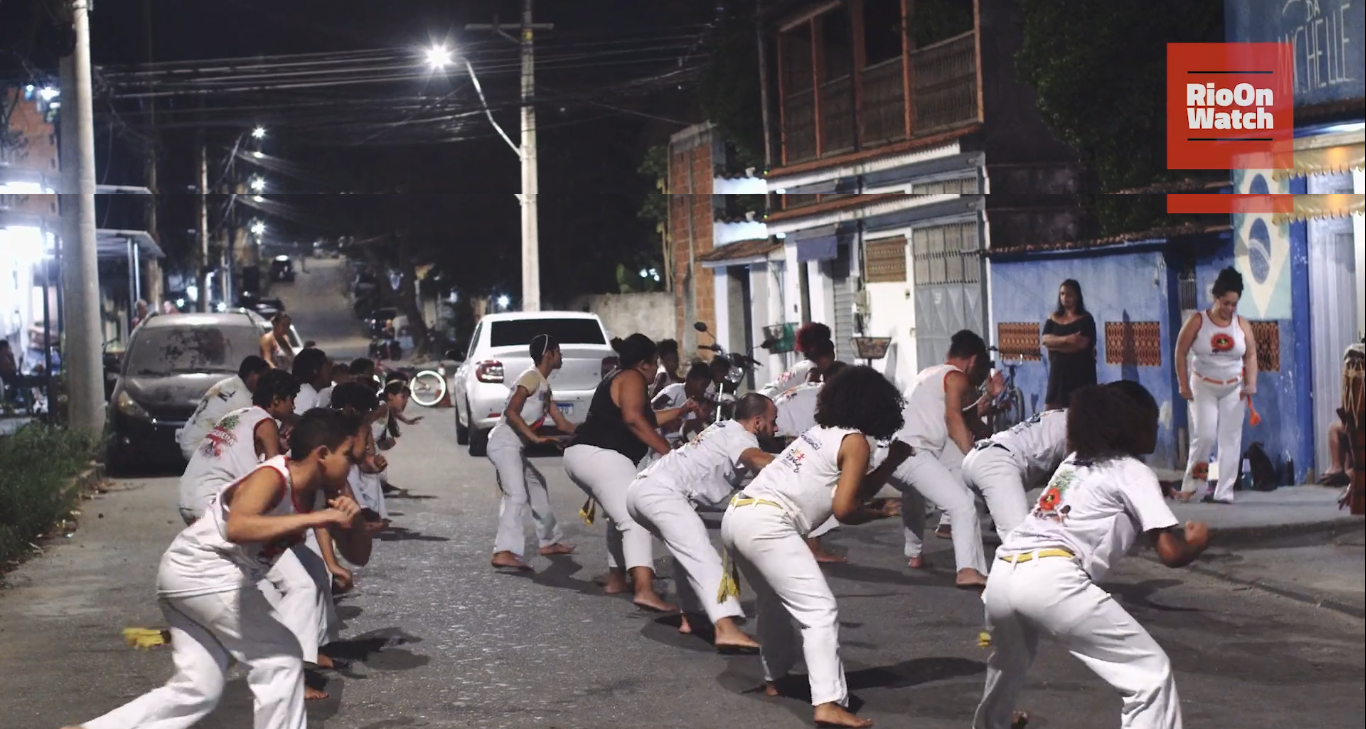
Capoeira Circles in the Iguaçu Arte Capoeira Cultural Center Circuit:
- Master Keto’s Circles: Every last Thursday of the month, starting at 7pm. Rua Democracia 226, Carmary, Nova Iguaçu.
- Mestrando Morcego: Every 2nd Wednesday of every other month (bi-monthly), starting at 7pm. Usually at Praça do Nova América, but due to a power outage, we are holding it at the small square by the train tracks on Av. Goiânia.
- Mestrando Pezão: Every 3rd Saturday of the month, starting at 7pm. Praça do Catatau, near the INSS in Nova Iguaçu.
- Professor Devagar: Every 1st Wednesday of the month, starting at 7pm. Praça Zumbi dos Palmares, Comendador Soares.
- Mestrando Merreca: Every 2nd Friday of the month starting at 7pm. Praça do BESC, Boa Esperança.
Watch the Video Report Here (Click for English Subtitles).
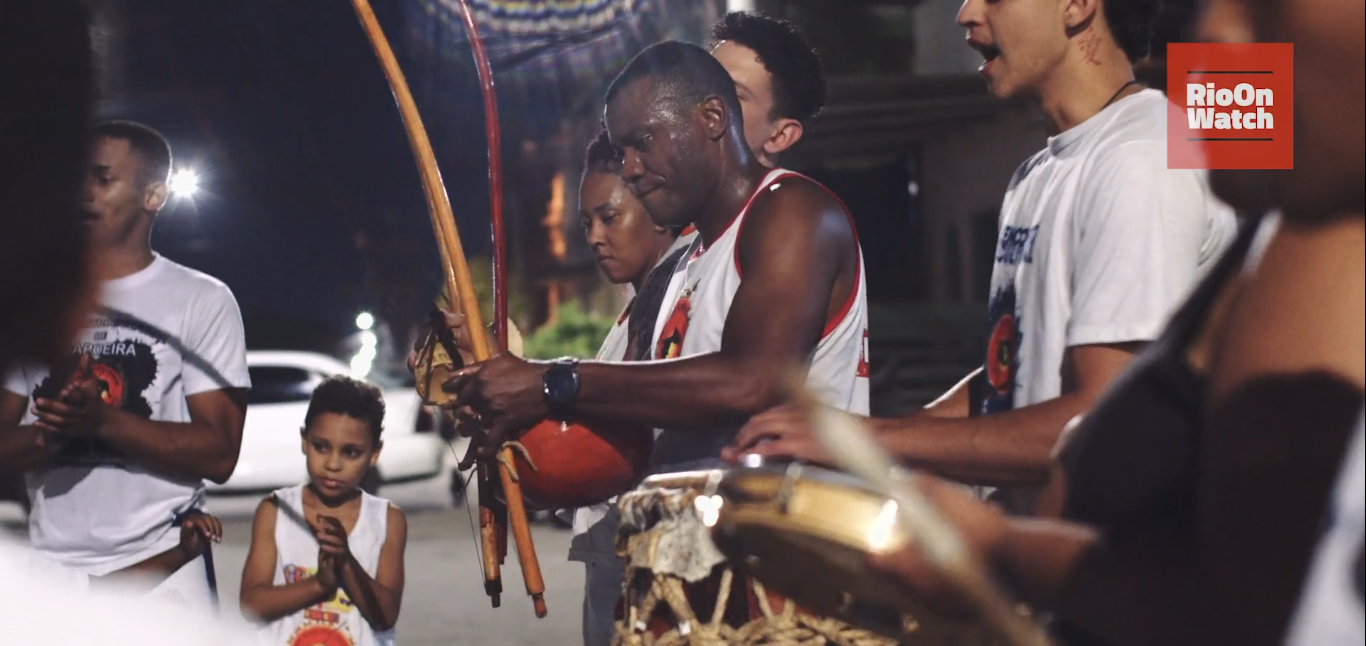
About the author: MC Onni is from Nova Iguaçu, Baixada Fluminense. Since 2008 he has worked as a cultural producer of Alma Versada and Sarau V (2014). As a rapper he released his first EP in 2017 and has announced a new album release for 2024.
